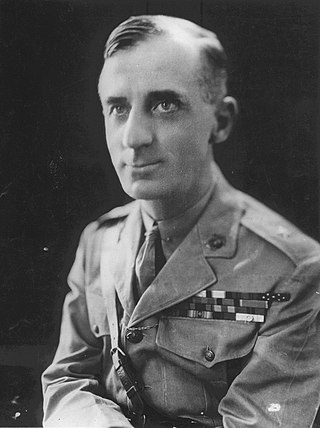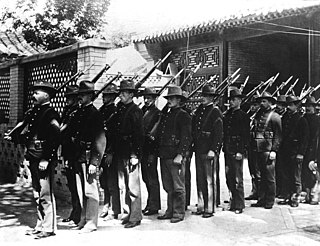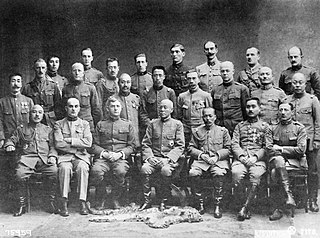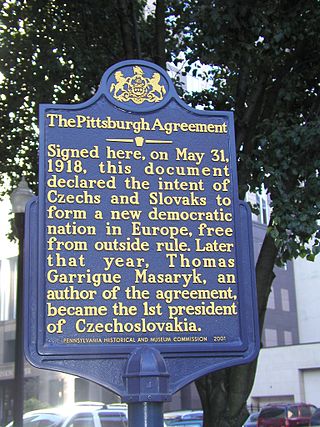
Czechoslovakia was a landlocked state in Central Europe, created in 1918, when it declared its independence from Austria-Hungary. In 1938, after the Munich Agreement, the Sudetenland became part of Germany, while the country lost further territories to Hungary and Poland. Between 1939 and 1945, the state ceased to exist, as Slovakia proclaimed its independence and the remaining territories in the east became part of Hungary, while in the remainder of the Czech Lands, the German Protectorate of Bohemia and Moravia was proclaimed. In 1939, after the outbreak of World War II, former Czechoslovak President Edvard Beneš formed a government-in-exile and sought recognition from the Allies.

Tomáš Garrigue Masaryk was a Czechoslovak politician, statesman, sociologist, and philosopher. Until 1914, he advocated restructuring the Austro-Hungarian Empire into a federal state. With the help of the Allied Powers, Masaryk gained independence for a Czechoslovak Republic as World War I ended in 1918. He co-founded Czechoslovakia together with Milan Rastislav Štefánik and Edvard Beneš and served as its first president.

Charles Austin Beard was an American historian and professor, who wrote primarily during the first half of the 20th century. A history professor at Columbia University, Beard's influence is primarily due to his publications in the fields of history and political science. His works included a radical re-evaluation of the Founding Fathers of the United States, whom he believed to be more motivated by economics than by philosophical principles. Beard's most influential book, An Economic Interpretation of the Constitution of the United States (1913), has been the subject of great controversy ever since its publication. While it has been frequently criticized for its methodology and conclusions, it was responsible for a wide-ranging reinterpretation of early American history.

Kenneth Lewis Roberts was an American writer of historical novels. He worked first as a journalist, becoming nationally known for his work with the Saturday Evening Post from 1919 to 1928, and then as a popular novelist. Born in Kennebunk, Maine, Roberts specialized in regionalist historical fiction, often writing about his native state and its terrain and also about other upper New England states and scenes. For example, the main characters in Arundel and Rabble in Arms are from Kennebunkport, the main character in Northwest Passage is from Kittery, Maine and has friends in Portsmouth, New Hampshire, and the main character in Oliver Wiswell is from Milton, Massachusetts.

Milan Rastislav Štefánik was a Slovak politician, diplomat, aviator and astronomer. During World War I, he served at the same time as a general in the French Army and as Minister of War for Czechoslovakia. As one of the leading members of the Czechoslovak National Council, he contributed decisively to the cause of Czechoslovak sovereignty, since the status of Czech- and Slovak-populated territories was one of those in question until shortly before the disintegration of the Austro-Hungarian Empire, in 1918.

The Czechoslovak Legion were volunteer armed forces composed predominantly of Czechs and Slovaks fighting on the side of the Entente powers during World War I. Their goal was to win the support of the Allied Powers for the independence of Lands of the Bohemian Crown from the Austrian Empire and of Slovak territories from the Kingdom of Hungary, which were then part of the Austro-Hungarian Empire. With the help of émigré intellectuals and politicians such as the Czech Tomáš Garrigue Masaryk and the Slovak Milan Rastislav Štefánik, they grew into a force of over 100,000 strong.
Paul George Vincent O'Shaughnessy Horgan was an American writer of historical fiction and non-fiction who mainly wrote about the Southwestern United States. He was the recipient of two Pulitzer Prizes for History.

The Business Plot was a political conspiracy in 1933, in the United States, to overthrow the government of President Franklin D. Roosevelt and install Smedley Butler as dictator. Retired Marine Corps Major General Smedley Butler asserted that wealthy businessmen were plotting to create a fascist veterans' organization with Butler as its leader and use it in a coup d'état to overthrow Roosevelt. In 1934, Butler testified under oath before the United States House of Representatives Special Committee on Un-American Activities on these revelations. Although no one was prosecuted, the congressional committee final report said, "there is no question that these attempts were discussed, were planned, and might have been placed in execution when and if the financial backers deemed it expedient."

The American Expeditionary Force, Siberia was a formation of the United States Army involved in the Russian Civil War in Vladivostok, Russia, after the October Revolution, from 1918 to 1920. The force was part of the larger Allied North Russia intervention. As a result of this expedition, early relations between the United States and the Soviet Union were poor.
Charles Morgan Herbert Atherton was an American Major League Baseball third baseman. Nicknamed "Prexy", he batted and threw right-handed, was 5 ft 10 in (1.78 m) tall and weighed 160 pounds. He was an accomplished musician and writer, as well as an athlete.

The term China Marines, originally referred to the United States Marines of the 4th Marine Regiment, who were stationed in Shanghai, China from 1927 to 1941 to protect American citizens and their property in the Shanghai International Settlement, during the Chinese Revolution and the Second Sino-Japanese War. Those Marines stationed at the embassy in Peking and the consulate in Tientsin referred to themselves as North China Marines.

The Siberian intervention or Siberian expedition of 1918–1922 was the dispatch of troops of the Entente powers to the Russian Maritime Provinces as part of a larger effort by the western powers, Japan, and China to support White Russian forces and the Czechoslovak Legion against Soviet Russia and its allies during the Russian Civil War. The Imperial Japanese Army continued to occupy Siberia even after other Allied forces withdrew in 1920.
Slovak Americans are Americans of Slovak descent. In the 1990 Census, Slovak Americans made up the third-largest portion of Slavic ethnic groups. There are currently about 790,000 people of Slovak descent living in the United States.

The Pittsburgh Agreement was a memorandum of understanding completed on 31 May 1918 between members of Czech and Slovak expatriate communities in the United States of America. It replaced the Cleveland Agreement of October 22, 1915.
John David Winters was an American historian at Louisiana Tech University in Ruston, Louisiana. He is known for his monograph The Civil War in Louisiana, which was published in 1963, released in paperback in 1991, and is still in print. When published, it was the first and only single volume history covering events in Louisiana from 1861-1865.

The revolt of the Czechoslovak Legion comprised the armed actions of the Czechoslovak Legion in the Russian Civil War against Bolshevik authorities, beginning in May 1918 and persisting through evacuation of the Legion from Siberia to Europe in 1920. The revolt, occurring in Volga, Ural, and Siberia regions along the Trans-Siberian Railway, was a reaction to a threat initiated by the Bolsheviks partly as a consequence of the Treaty of Brest-Litovsk. One major secondary consequence of victories by the Legion over the Bolsheviks was to catalyze anti-Bolshevik activity in Siberia, particularly of the Committee of Members of the Constituent Assembly, and to provide a major boost for the anti-Bolshevik or White forces, likely protracting the Russian Civil War.

The Czech diaspora refers to both historical and present emigration from the Czech Republic, as well as from the former Czechoslovakia and the Czech lands. The country with the largest number of Czechs living abroad is the United States.
Arthur Sullivant Hoffman was an American magazine editor. Hoffman is best known for editing the acclaimed pulp magazine Adventure from 1912 to 1927, as well as playing a role in the creation of the American Legion.

Czechoslovak National Council was an organization founded by Czech and Slovak émigrés during World War I to liberate their homeland from Austria-Hungary. During the closing weeks of the war, the Czechoslovak National Council was formally upgraded to a provisional government and its members were designated to hold top offices in the First Czechoslovak Republic.
The West Siberian rebellion was the largest of the Russian peasant uprisings against the nascent Bolshevik state. It began in early 1921 and was defeated at the end of 1922, due in part to the brutal repression of the militarily superior Red Army, and the famine that the region suffered.














